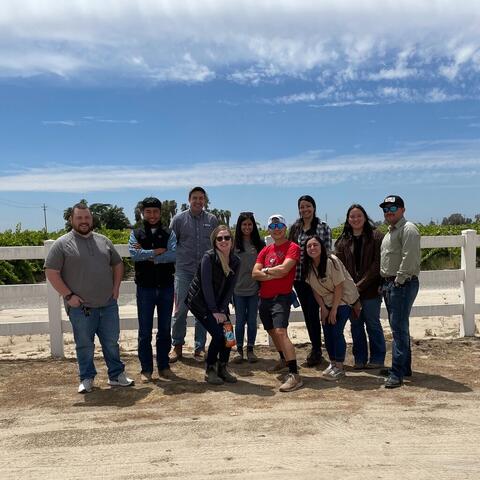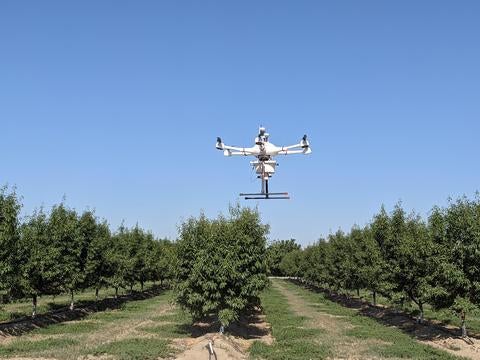Recruiting Postdoctoral Scholar - Sterile Insect Technique in Orchards
Dr. Houston Wilson, Dept. Entomology, University of California - Riverside
Kearney Agricultural Research and Extension Center (near Fresno, CA)
Wilson Lab Website: http://treecrops.ucr.edu/
Location: Fresno, CA | Annual Salary: $60,000 - $71,952 | Apply By: 1/12/24
Submit Application via Email to: houston.wilson@ucr.edu
Position Posted to Entomology Society of America Career Center: https://careers.entsoc.org/jobs/19510054/development-of-sterile-insect-technique-for-lepidoptera-pests-in-california-tree-nut-orchards#expand
Position Description
The University of California, Riverside, Department of Entomology (http://entomology.ucr.edu/) invites applicants for a full-time postdoctoral scholar position to conduct applied research and extension under the mentorship of Dr. Houston Wilson (http://treecrops.ucr.edu/) and Dr. Chuck Burks (https://www.ars.usda.gov/pacific-west-area/parlier/sjvasc/cpq/people/charles-burks/). The Wilson and Burks Labs are co-located in Parlier, CA, which is home to both the UC Kearney Agricultural Research and Extension Center (https://kare.ucanr.edu/) as well as the USDA Agricultural Research Service (ARS) San Joaquin Valley Agricultural Sciences Center (https://www.ars.usda.gov/pacific-west-area/parlier/sjvasc/). This postdoctoral scholar position will be based at the USDA ARS facility but co-mentored by Wilson and Burks as part of larger collaboration between these two lab groups.
This postdoctoral scholar position will contribute to an on-going project to develop sterile insect technique (SIT) for navel orangeworm (Pyralidae: Amyelois transitella) in California pistachio, almond and walnut orchards. The position will be for a two-year residence with possible renewal up to five years, contingent on funding. The position will begin in winter/spring 2024, or as soon as possible after that time. Salary ranges from $60,000 to $71,952 annually depending on experience.
Navel Orangeworm, Primary Pest of California Tree Nuts
Almonds, pistachios and walnuts are extensively planted and highly valuable crops in California, which is the leading agricultural economy in the United States. There are currently just over 1.8 million acres of these tree nut orchards in the state, which generate an annual farm-gate value of approximately $9.3 billion. Within the California agricultural matrix, these three tree nut crops account for approximately 17-18% of both total planted cropland and agricultural value generated in the state annually.
Navel orangeworm (NOW) is the primary pest of tree nuts. Adults oviposit onto the nuts and the larvae feed directly on the nut kernels. This not only reduces crop yield and quality, but NOW infestation has also been associated with the presence of the fungus Aspergillus flavus that can produce aflatoxin, a known human carcinogen that is heavily regulated in key markets. As such, tree nut growers have very little tolerance for NOW infestation and typically aim to keep infestation at <2%. NOW overwinter as larvae/pupae in remnant nuts that were not harvested. As such, crop sanitation is primary component of NOW management, along with mating disruption, well-timed insecticide applications and timely harvest.
Development of Sterile Insect Technique for Navel Orangeworm
Recently, the California pistachio and almond industries partnered with the California Department of Food and Agriculture (CDFA) and the United State Department of Agriculture (USDA) Animal and Plant Health Inspection Services (APHIS) to make use of a mass-rearing and irradiation facility to produce large quantities of sterile NOW. Since this facility was initially developed for another species of Lepidoptera pest, efforts over the past 6 years have focused on how to best retrofit and optimize the current production, irradiation, transport and release process to best accommodate navel orangeworm. The goal of this project is to develop use of SIT for NOW as a complimentary practice to the other integrated pest management (IPM) strategies mentioned above. A recent article in the National Nut Grower (link here) provides an overview of the current program.
Postdoctoral Scholar - Roles and Responsibilities
The purpose of this postdoctoral scholar position is to help carry out laboratory and field experiments associated with this effort to develop SIT for NOW. Potential focal areas for research include mass-rearing, handling and sterilization procedures, as well as transportation, release methods and field performance of sterile NOW. In addition to this work directly focused on the sterile moth production chain, more broader efforts are also being carried out to better understand the landscape ecology and dispersal of NOW. The final candidate will primarily help design, implement and analyze a series of laboratory and field experiments in one or more of these focal areas, as well as support on-going outreach and extension efforts to communicate all findings to the California tree nut industry, as well as to the scientific community at the regional, national and international level.
Location and Affiliation
While the postdoctoral scholar will be a member of Dr. Houston Wilson’s laboratory (http://treecrops.ucr.edu/), they will be expected to work collaboratively with all project PIs, which include Dr. Charles Burks (USDA-ARS, lab website), Dr. Joel Siegel (USDA-ARS, lab website) and Dr. Raman Bansal (USDA-ARS, lab website). Lab and office space will be made available to the postdoctoral scholar within the Burks Lab at the USDA ARS San Joaquin Valley Agricultural Sciences Center in Parlier, CA (map here). Note that Dr. Wilson's lab is based across the street at the UC Kearney Agricultural Research and Extension Center (http://kare.ucanr.edu/).
Qualifications
Applicants should be recent recipients of a doctoral degree (or anticipated recipient in winter/spring 2024), with demonstrated interest and publication ability in agricultural entomology, ecology and/or insect biology. They should be experts in statistical analysis of ecological and biological datasets (including generalized linear mixed-effects models with non-Gaussian distributions) in R and other appropriate software. While expertise in geographic information systems (GIS) is preferred, it is not necessarily required. The academic record must have demonstrated capacity to work independently and lead the development and publication of research results. Experience working with orchard or other crop production systems, prior coursework on agronomic details of crop production systems, and/or experience communicating with growers about technical details of their production systems is strongly preferred. Interest in landscape ecology, insect dispersal, organic agriculture, and/or cooperative extension is preferred but not required. The position is open with respect to academic discipline, and could include entomology, agroecology, biology or other appropriate natural science training.
Application Process
Please notify Dr. Houston Wilson (houston.wilson@ucr.edu) as soon as possible if you intend to apply, and send full applications electronically to houston.wilson@ucr.edu. Applications received by this date will be given first consideration, although we will continue to accept applications after that date. Applications should include a CV, letter describing research interests and background as applied to this project, examples of any relevant publications, and contact information for three references. Top candidates will be interviewed by Zoom or phone with possibility of a campus visit, and asked to supply letters of reference. For more information about this position, please contact Dr. Houston Wilson, Assoc. Cooperative Extension Specialist, Department of Entomology, at houston.wilson@ucr.edu.
UC Riverside Notifications
UCR is a world-class research university with an exceptionally diverse undergraduate student body. Its mission is explicitly linked to providing routes to educational success for underrepresented and first-generation college students. A commitment to this mission is a preferred qualification.
The University of California is an Equal Opportunity/Affirmative Action Employer. All qualified applicants will receive consideration for employment without regard to race, color, religion, sex, sexual orientation, gender identity, national origin, age, disability, protected veteran status, or any other characteristic protected by law.
University of California COVID-19 Vaccination Program Policy: As a condition of employment, you will be required to comply with the University of California SARS-CoV-2 (COVID-19) Vaccination Program Policy. All Covered Individuals under the policy must provide proof of Full Vaccination or, if applicable, submit a request for Exception (based on Medical Exemption, Disability, and/or Religious Objection) or Deferral (based on pregnancy) no later than the applicable deadline. For new University of California employees, the applicable deadline is eight weeks after their first date of employment.

